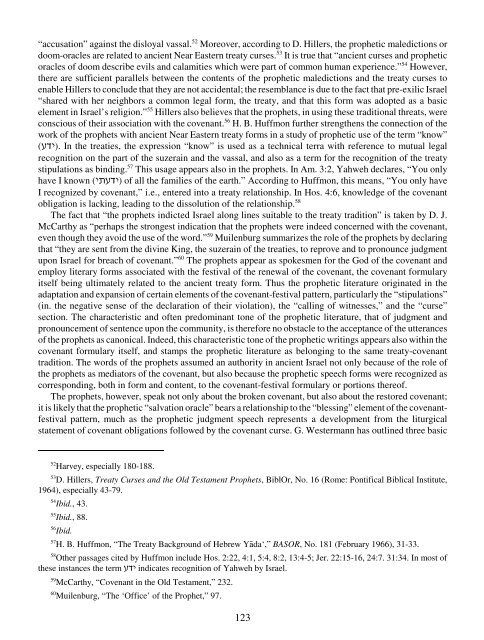The Origin of Canonicity Old Testament
The Origin of Canonicity Old Testament
The Origin of Canonicity Old Testament
You also want an ePaper? Increase the reach of your titles
YUMPU automatically turns print PDFs into web optimized ePapers that Google loves.
“accusation” against the disloyal vassal. 52 Moreover, according to D. Hillers, the prophetic maledictions or<br />
doom-oracles are related to ancient Near Eastern treaty curses. 53 It is true that “ancient curses and prophetic<br />
oracles <strong>of</strong> doom describe evils and calamities which were part <strong>of</strong> common human experience.” 54 However,<br />
there are sufficient parallels between the contents <strong>of</strong> the prophetic maledictions and the treaty curses to<br />
enable Hillers to conclude that they are not accidental; the resemblance is due to the fact that pre-exilic Israel<br />
“shared with her neighbors a common legal form, the treaty, and that this form was adopted as a basic<br />
element in Israel’s religion.” 55 Hillers also believes that the prophets, in using these traditional threats, were<br />
conscious <strong>of</strong> their association with the covenant. 56 H. B. Huffmon further strengthens the connection <strong>of</strong> the<br />
work <strong>of</strong> the prophets with ancient Near Eastern treaty forms in a study <strong>of</strong> prophetic use <strong>of</strong> the term “know”<br />
(3$*). In the treaties, the expression “know” is used as a technical terra with reference to mutual legal<br />
recognition on the part <strong>of</strong> the suzerain and the vassal, and also as a term for the recognition <strong>of</strong> the treaty<br />
stipulations as binding. 57 This usage appears also in the prophets. In Am. 3:2, Yahweh declares, “You only<br />
have I known (*;3$*) <strong>of</strong> all the families <strong>of</strong> the earth.” According to Huffmon, this means, “You only have<br />
I recognized by covenant,” i.e., entered into a treaty relationship. In Hos. 4:6, knowledge <strong>of</strong> the covenant<br />
obligation is lacking, leading to the dissolution <strong>of</strong> the relationship. 58<br />
<strong>The</strong> fact that “the prophets indicted Israel along lines suitable to the treaty tradition” is taken by D. J.<br />
McCarthy as “perhaps the strongest indication that the prophets were indeed concerned with the covenant,<br />
even though they avoid the use <strong>of</strong> the word.” 59 Muilenburg summarizes the role <strong>of</strong> the prophets by declaring<br />
that “they are sent from the divine King, the suzerain <strong>of</strong> the treaties, to reprove and to pronounce judgment<br />
upon Israel for breach <strong>of</strong> covenant.” 60 <strong>The</strong> prophets appear as spokesmen for the God <strong>of</strong> the covenant and<br />
employ literary forms associated with the festival <strong>of</strong> the renewal <strong>of</strong> the covenant, the covenant formulary<br />
itself being ultimately related to the ancient treaty form. Thus the prophetic literature originated in the<br />
adaptation and expansion <strong>of</strong> certain elements <strong>of</strong> the covenant-festival pattern, particularly the “stipulations”<br />
(in. the negative sense <strong>of</strong> the declaration <strong>of</strong> their violation), the “calling <strong>of</strong> witnesses,” and the “curse”<br />
section. <strong>The</strong> characteristic and <strong>of</strong>ten predominant tone <strong>of</strong> the prophetic literature, that <strong>of</strong> judgment and<br />
pronouncement <strong>of</strong> sentence upon the community, is therefore no obstacle to the acceptance <strong>of</strong> the utterances<br />
<strong>of</strong> the prophets as canonical. Indeed, this characteristic tone <strong>of</strong> the prophetic writings appears also within the<br />
covenant formulary itself, and stamps the prophetic literature as belonging to the same treaty-covenant<br />
tradition. <strong>The</strong> words <strong>of</strong> the prophets assumed an authority in ancient Israel not only because <strong>of</strong> the role <strong>of</strong><br />
the prophets as mediators <strong>of</strong> the covenant, but also because the prophetic speech forms were recognized as<br />
corresponding, both in form and content, to the covenant-festival formulary or portions there<strong>of</strong>.<br />
<strong>The</strong> prophets, however, speak not only about the broken covenant, but also about the restored covenant;<br />
it is likely that the prophetic “salvation oracle” bears a relationship to the “blessing” element <strong>of</strong> the covenantfestival<br />
pattern, much as the prophetic judgment speech represents a development from the liturgical<br />
statement <strong>of</strong> covenant obligations followed by the covenant curse. G. Westermann has outlined three basic<br />
52 Harvey, especially 180-188.<br />
53 D. Hillers, Treaty Curses and the <strong>Old</strong> <strong>Testament</strong> Prophets, BiblOr, No. 16 (Rome: Pontifical Biblical Institute,<br />
1964), especially 43-79.<br />
54 Ibid., 43.<br />
55 Ibid., 88.<br />
56 Ibid.<br />
57 H. B. Huffmon, “<strong>The</strong> Treaty Background <strong>of</strong> Hebrew Y~da‘,” BASOR, No. 181 (February 1966), 31-33.<br />
58 Other passages cited by Huffmon include Hos. 2:22, 4:1, 5:4, 8:2, 13:4-5; Jer. 22:15-16, 24:7. 31:34. In most <strong>of</strong><br />
these instances the term 3$* indicates recognition <strong>of</strong> Yahweh by Israel.<br />
59 McCarthy, “Covenant in the <strong>Old</strong> <strong>Testament</strong>,” 232.<br />
60 Muilenburg, “<strong>The</strong> ‘Office’ <strong>of</strong> the Prophet,” 97.<br />
123


